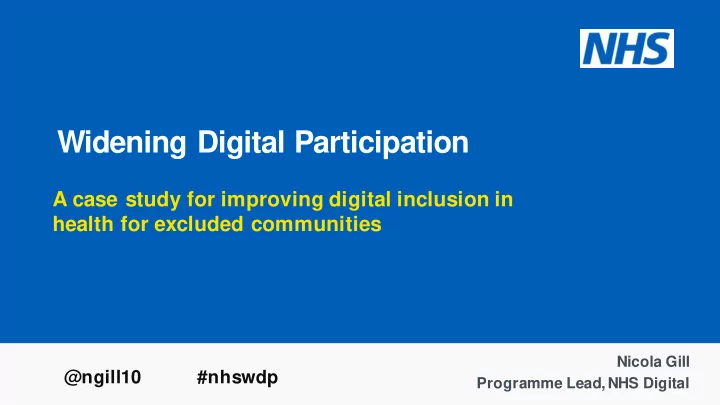

Widening Digital Participation A case study for improving digital inclusion in health for excluded communities Nicola Gill @ngill10 #nhswdp Programme Lead, NHS Digital
About WDP Set up to ensure everyone has the confidence, skills and means to access and use digital health services and tools – particularly the most excluded
Benefits of health technologies • Provides access to information and tools to help people stay well • Convenience • Choice • Better experience – if done right! • Reduces the burden on frontline services 3
The challenge • 11m lack the confidence, skills and means to get online • Complex health & care needs • Other health inequalities • Difficult to engage with • Multiple barriers – no one solution 4
What we’re doing • Design for inclusion first • Learn more about needs & barriers and try new things (pathfinders) • Develop toolkits and guides • Build capability locally & nationally • Share everything 5
Digital Inclusion pathfinders • Cross sector local partnerships • Learning more about needs & barriers • Creating solutions that fit in peoples’ day to day lives - ‘go where they go’ • Use local infrastructure where possible • Try new things – fail – iterate • Develop ‘How to’ guides • Share & scale what works 6
Digital-health-lab.org www.digital-health-lab.org 7
NAILSEA
Can a physical space in the centre of a community improve access and use of digital health tools and services?
Ian Morrell Development Manager @65 High Street Nailsea (North Somerset)
People le-Ce Centred Healt lth and Wellb lbeing SOCIAL (wellbeing) MEDICAL MODEL (illness) 3 rd Sector, MODEL Families/friends, Hospital, Clinic, Communities GPs, primary care SMART TECHNOLOGY
Treat the Perso son not the Condit itio ion ‘no decision about me without me’ • Wellbeing is made at homes and in communities, not in hospitals and clinics • Community organisations are resourceful, adaptable and cost effective • ‘Community’ is not an homogenous entity • Community groups need places (not one-stop shops) to meet, share, support • Develop knowledge, confidence, coping skills and resilience
Linki king the Medic ical l and Socia ial l Models ls Statutory Bodies e.g NHS, District/County Councils, large charities BARRIERS TO COLLABORATION SCALE not done/invented here, silos, budgets, policies, professional boundaries, reorganisations, trust, power 3 rd Sector e.g. volunteers, local charities, Community Interest Companies (CICs), housing associations
Chall llenges (It’s amazing what gets done when no-one wants to take the credit) • Money is not the biggest challenge • Abundance of: silos, short-term funding/commissioning, paralysis by analysis and pilotitis • Lack of: imagination, joined-up thinking and will (political, organisational and personal)
Serendip ipit ity y Project Plan (It’s better to apologise than ask permission) • Rule 1: have a clear ethos (there are no more rules) • Labels = silos • Get less organised/do less project planning (inhibits creativity, reinforces silos, misses opportunities, creates opportunities to excuse inaction) • Trust people: listen and learn • Synergy happens one conversation at a time
Places Connect People le • Universal Personalised Care we are part of an essential multi-channel approach • Social prescribing medical or social model of care? • ‘Supporting people to make good decisions’: ‘places’ connect people with lived experience • King’s Fund: A Vision for Population Health
Your Cancer Café Nailsea 18
Why? • Diagnosed with Stage 3 breast cancer February ‘ 18 • Breast Care nurse on diagnosis • Nothing through chemotherapy or radiotherapy • Lack of emotional support, yet research suggests that physical recovery is better if mental health is good • People refusing to have treatment because their experience was so poor • A need for mutual support – not talked to 19
How? • Approached No 65 • Ensured no restrictions • Found volunteers through social media • Advertised event through social media and local press • Put aside £100 to set it up • Run tombola to raise funds • Treatments, cakes etc donated by the local community 20
How is it going? • About 70 people came to the first meeting • Press are interested in promoting it – Radio Bristol • People are contacting me to find out how to set one up in their area • Local charities are running events for Your Cancer Café • Numbers are growing and are from a wider area 21
Recommend
More recommend